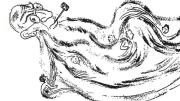Scholars too infrequently tell lay readers the human passions, as opposed to the intellectual itches, that fuel their interests. In Honey on the Page: A Treasury of Yiddish Children’s Literature (New York University Press, $29.95), editor and translator Miriam Udel ’98, Ph.D. ’08, associate professor of Yiddish language, literature, and culture in German studies and in the Tam Institute of Jewish Studies at Emory, breaks the mold, charmingly. Along with her scholarly notes on the translations and on the literature itself, Udel, a former Ledecky Undergraduate Fellow at this magazine, addresses a message “To the Child Reader.” It is excerpted here, for adults to enjoy, too—with the rich anthology of stories they may not have known before.
When I started working on this book, I had three very important readers in mind, one of whom wasn’t even born yet. They are my sons. They all like books, and right now, as two teenagers and a preschooler, each one likes different kinds of books than his brothers. I tried to put stories into this collection that would appeal to each of them and teach them about faraway places and times that were different from our own but also about ideas and experiences that are very familiar because they are already important to our family.
The stories and poems…here were originally written in Yiddish, the language that the Jewish people spoke in eastern Europe for almost a thousand years and a language that they carried with them as a precious heritage when they left Europe for places like the United States, Canada, Mexico, Argentina, South Africa, Australia, and Israel. The number of Yiddish speakers today is relatively small, but people speak Yiddish on almost every continent!
A language isn’t just a way of saying things: what you hope for, what you’re afraid of, what you dream about, or what you ate for lunch. A language is also a way of carrying a culture with you. In fact, the things that you hope for, fear, dream about, and eat for lunch are all influenced by your culture. So when you read this book, which is full of stories and poems that I’ve translated into English, you are also catching a glimpse of the culture and civilization of kids who spoke Yiddish 50, 75, or 100 years ago. Some of them lived in Poland or Lithuania, others lived in New York, and still others lived in Buenos Aires, Argentina, or Havana, Cuba.…
Some of the kids who originally read these stories went to schools with Jewish teachers and students, where they studied all day in Yiddish. Others attended public schools during the morning and Yiddish after-schools every afternoon. Still others went to schools where boys and girls were taught very differently from one another and couldn’t even really be friends with each other. Some of the children for whom these stories were written lived in places where it was difficult or dangerous to be Jewish.…
A lot of the events described in these stories could happen to any kid, almost anywhere: getting lost, going skating, having a birthday party, visiting grandparents, making a snowman (or snow grandma), or feeling nervous the night before the first day of school. And some of the events couldn’t really happen anywhere other than a story: catching a ride on a lion’s back, getting snatched by a giant, talking with a goat, or losing a calf in a farmer’s long beard.









